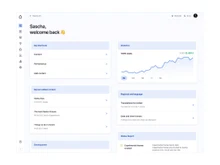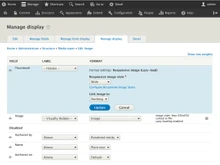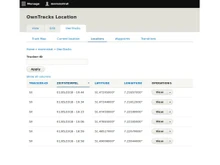How are Wix and Drupal Different?
Wix is a cloud-based website builder with a drag-and-drop interface that makes it possible for even non-technical people to swiftly create websites. It is perfect for portfolios, personal blogs, small enterprises, and other simple websites. Wix is a fantastic choice for consumers who value speed and usability because it provides a wide range of templates and integrated features like SEO tools and e-commerce possibilities.
Drupal, on the other hand, is a powerful, open-source CMS designed for developers and companies who require highly configurable websites with particular features. Complex user roles, taxonomies, and structured data are just a few of the sophisticated content management software that Drupal provides. Larger businesses, official websites, or any project requiring a high degree of performance, security, and customization are the greatest candidates for it.
Comparison Table: Wix vs Drupal
| Comparison of Wix and Drupal |
| Feature |
Wix |
Drupal |
| Ease of Use |
Extremely user-friendly, drag-and-drop |
Steep learning curve, developer-oriented |
| Customization & Flexibility |
Limited to templates and basic features |
Highly customizable (developer-focused) |
| Content Management |
Basic content management tools |
Advanced content types, taxonomies, and roles |
| Extensions & Modules |
Limited app market (200+ apps) |
40,000+ modules (community-supported) |
| Performance & Scalability |
Good for small to medium websites |
Enterprise-grade scalability, handles high traffic |
| Security |
Basic security features |
High-level security, used by governments and large organizations |
| SEO & Marketing Tools |
Built-in SEO tools, easy to use |
Requires modules (Pathauto, Metatag) but offers more customization |
| Multilingual Support |
Easy to implement |
Highly flexible and customizable |
| Community & Support |
Extensive support through forums and live chat |
Developer-heavy global community, detailed documentation |
| Pricing |
Starts at $17/month |
Price on request |
Detailed Feature Comparison of Drupal vs Wix
- Learning curve and ease of use: Wix is well-known for its drag-and-drop builder and lack of coding requirements. Users can use pre-made templates to quickly establish a website. It is perfect for beginners because of its user-friendly interface. Drupal is better suited for people with technical know-how or a development team because of its steeper learning curve. Although it provides extensive flexibility, utilizing its full potential necessitates an understanding of the underlying architecture.
- Flexibility & personalization: Although Wix provides a variety of templates and design choices, personalization is largely constrained by the platform's capabilities. Users have limited deep customization possibilities, although they can add certain apps and widgets. Drupal has great adaptability, enabling developers to alter nearly every element of the website. It is ideal for large-scale applications since it supports complex data structures, fields, views, and custom content kinds.
- Content Management: With features for blogs, photos, and e-commerce, Wix offers simple content management capabilities. Although it is simple for novices to grasp, it is less effective for intricate content management. Custom content categories, comprehensive permissions, and highly organized material are just a few of the advanced content management features that Drupal provides. Large websites with intricate content organization requirements are ideal for it.
- Add-ons & Extensions: Wix's App Market offers more than 200 apps to increase functionality. In contrast to Drupal's collection of more than 40,000 community-contributed modules, this is far smaller. Drupal offers a huge selection of modules for practically every kind of use scenario. However, installing and configuring many of these calls for technical know-how.
- Scalability and Performance: Wix works well for small to medium-sized websites. However, it might not be able to handle very high visitor volumes. Its design prioritizes usability over large-scale speed efficiency. Drupal can manage intricate, busy websites and is made for large-scale applications. It is perfect for enterprise-level websites because of its advanced caching, speed optimization, and scalability features.
- Security & Compliance: Wix provides fundamental security features, including SSL certificates and defense against frequent security flaws. Small to medium-sized websites can get by with it, but major businesses' strict security requirements might not be met. Large enterprises and government organizations trust Drupal because of its strong security features. It offers regular security updates and fine-grained role-based access controls.
- SEO & Marketing Tools: Meta tags, redirects, and an SEO wizard that walks users through fundamental optimization tasks are among the built-in SEO features that Wix offers. In contrast to Drupal, the level of control is constrained. For SEO features, Drupal needs add-ons like Pathauto and Metatag. Although this SEO-friendly CMS requires more setup, it offers more control and flexibility over SEO components, making it perfect for intricate marketing plans.
- Localization & Multilingual: Wix provides a user-friendly multilingual capability through its settings that enables users to produce content in many languages rapidly. More sophisticated multilingual features, such as complete control over language, content translation, and user interface, are included in Drupal’s top-tier plans. Because of this, it's a better choice for websites that need precise localization.
- Community & Support: Wix provides live chat assistance and a comprehensive knowledge base around the clock. The site boasts a sizable user base with a wealth of user-generated content and lessons. With a large developer community worldwide, Drupal offers comprehensive documentation and a range of support forums. Although the support is strong, successful engagement necessitates a higher level of technical expertise.
Drupal and Wix Pricing
Although Wix and Drupal are both free to use, there are some substantial differences in the fees associated with creating and maintaining a website. Wix has a free plan, customers are urged to switch to a premium plan to access more features, more storage, and the ability to customize their domain.
Wix’s pricing plans start at $17 per month for Light and Basic use. Its Core plan costs $29/month, the Business plan costs $36/month, and the Business Elite plan costs $159/month. Drupal is a freemium CMS platform. Though using it comes with fees for development, hosting, and any custom modules or themes. It typically has greater setup and maintenance costs since it requires more developers.
Which is Better—Drupal or Wix?
The requirements of your project and your degree of technical proficiency will determine which content management system (CMS) is appropriate for you. If you require a quick, affordable, and user-friendly solution for small to medium-sized websites, blogs, or portfolios, choose Wix. For users who wish to create and maintain a website with ease but lack technical expertise, it's ideal. If you require a robust, adaptable, and scalable CMS for a sizable, intricate website or online application, choose Drupal. For companies, government organizations, and enterprises that need cutting-edge features, security, and performance, Drupal is perfect.
Still Not Sure Which CMS to Choose? Talk to our CMS Experts at Techjockey and get tailored advice based on your website goals and technical needs.


 11 Ratings & 11 Reviews
11 Ratings & 11 Reviews




















